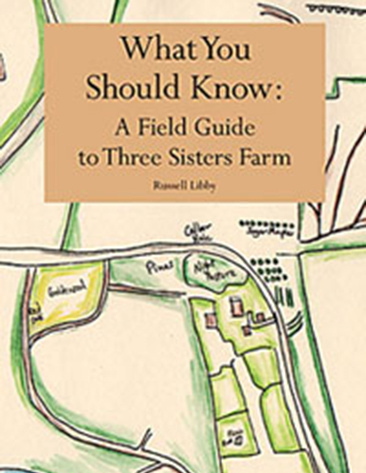Natural energies
What You Should Know:
A Field Guide to Three Sisters Farm
By Russell Libby
Blackberry Books, Nobleboro, 2013
80 pages, trade paperback, $15
When Russell Libby died in December 2012, the sense of loss extended with sort of superluminal immediacy out to Maine’s whole farming and agricultural community and beyond, because he had invested so much positive energy in the work of developing constructive, sustainable agricultural practices. That energy could not easily be replaced in organizations such as the Maine Organic Farmers and Gardener Association in Unity, where he was executive director for years, or boards such as the Agricultural Council of Maine and the University of Maine Board of Agriculture, or the Maine Farmland Trust which he co-founded in 1999 with John Piotti.
But off the radar of this important public work, he also wrote poetry, and two collections published by Blackberry Press in Nobleboro will carry his energies forward for time to come. One is “Balance: A Late Pastoral” (2007), and the recent volume is “What You Should Know: A Field Guide to Three Sisters Farm.”
“What You Should Know” offers observations and depictions of the care and feeding of the natural world on Libby’s family farm in Mount Vernon, where he lived for nearly 30 years. Every poem, in the plain-spoken diction and rhythms of everyday speech, provides meticulous, Thoreau-like attention to natural detail. We get ruminations on pruning (“Don’t forget to do it!”), planting (“This is a homestead orchard, really, / And now it’s starting to produce / more than we can use”), particular features (“The Yard Maple,” “Cedars,” “Clay,” “Wells”), and instructions for natural living, as in “Rules for Trees”:
I have my own simple rules.
Look for straight trees.
Help them grow.
Wait.
The key word in these lines is “wait.” “What You Should Know” is not just a collection of cool descriptions of woods and fields, but a series of ruminations on the fact that we and everything else are all happening in an ecology of time. Trees, fields, farms and people have unfolded from an ever-present past that you can see now, and continue to unfold in an ever-present future.
In “Marking Time,” he says, “I’m tired of clocks and calendars,” which restrict time to single disconnected moments, and replaces them with a different imaginative practice:
I’m building a phenology of farms,
starting in reverse. When equipment, once
stored in the barn, is left out in the field,
the end is near. â¦
A new barn, or one being repaired, is
always a sign of rebirth.
Practically every poem in the book is a reflection on where something came from, what it looks like now and what it will be in a year or a century. Libby’s recurrent advice to deal with the timeless nature of nature: be patient.
A lot of readers who feel or seek connections to the natural world, but who otherwise shy away from poetry, will find a lot to like here. The down-to-earth, prosaic diction of these poems makes them very easy to grasp.
The energies that Russell Libby provided to Maine’s agricultural community are alive in this book and will endure into any future where there are still trees and poetry.
“What You Should Know” is available from Blackberry Books, 617 East Neck Road, Nobleboro 04555 and from online and local book sellers.
Dana Wilde writes the Backyard Naturalist column for the Kennebec Journal and Morning Sentinel and runs the Parallel Uni-Verse website for Maine poetry at www.dwildepress.net/universe.
Send questions/comments to the editors.



Success. Please wait for the page to reload. If the page does not reload within 5 seconds, please refresh the page.
Enter your email and password to access comments.
Hi, to comment on stories you must . This profile is in addition to your subscription and website login.
Already have a commenting profile? .
Invalid username/password.
Please check your email to confirm and complete your registration.
Only subscribers are eligible to post comments. Please subscribe or login first for digital access. Here’s why.
Use the form below to reset your password. When you've submitted your account email, we will send an email with a reset code.